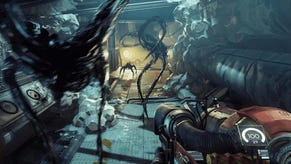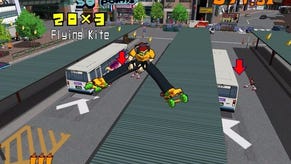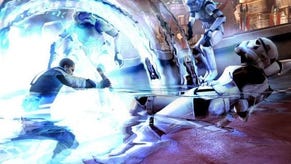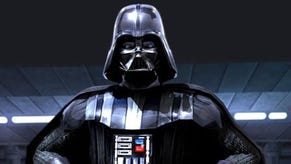Star Wars: The Force Unleashed
Delusions of grandeur?
Enemy AI is laughably bad at times. It's cute to watch Stormtroopers desperately grabbing onto each other to avoid being blown away by your Force powers, but apart from that their primary directive seems to be to stand still and fire. LucasArts clearly hopes you won't really notice this when facing down a small army, but doesn't always get away with it.
One particularly dumb moment sticks in the mind: faced with a marauding Rancor, I quickly ran away and turned back to attack from a distance. The beast had stopped dead in its tracks, but was still perfectly in range for my lightsaber throw. I just repeated the move until it collapsed without argument. It's on occasions like this that the mask begins to slip.
The Force Unleashed's best levels are, unsurprisingly, those set in locations instantly familiar to Star Wars fans, and it's here the unalloyed thrill of authenticity enables you to overlook some of the game's flaws. They are brought into sharp relief, however, when it comes to the unfamiliar. Felucia is a case in point: infinitely less iconic both in landscape and inhabitants when compared with other areas in the game, and if it wasn't for the lightsaber in your character's hand and the clever physics, this could be any old third-person action title from recent years.
You also realise how uninspired and linear much of the basic level design is: again, without the tingle of familiarity the game is regularly revealed as a succession of large rooms and corridors, filled with grunts to clear. My issues with the weak AI were compounded when, weary of the slog across the bland mushroom planet, I decided to leg it ahead. I discovered I could make it through vast areas without so much as a scratch, and without anyone bothering to follow me.
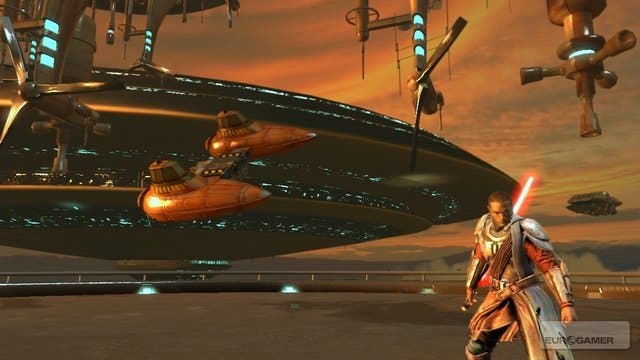
LucasArts would probably argue this misses the point of the experience entirely, but I would counter by saying the conceit can only work if the gameplay is consistently thrilling and engaging. It isn't. The other thing you miss by taking the lazy coward's option is currency with which to upgrade your powers (gained by slaying enemies as well as sniffing out concealed pick-ups). But, playing on the default difficulty setting (the second of four), this did not impact my ability to sail through the game with very little trouble.
The Force Unleashed is not a difficult game (and the challenge added on the higher settings is artificial rather than a case of smartening up the stupid enemies), and it's also not an especially long one. I completed it the first time around in a couple of evenings, the end arriving rather abruptly. But notice that I said the first time.
Linear and relatively straightforward the game may be, but the indisputable joy of applying Force powers to the world was enough to draw me back in for a second pop. Commendable details reveal themselves the more you take your time: smash a crate through a window on a space station, for instance, and the subsequent vacuum will suck nearby stormtroopers out before a metal shutter quickly slams down and regulates the atmosphere. Playfulness is rewarded in spades.
And herein lies the biggest problem: for all the rich possibilities thrown up by a muscular game engine, taking advantage is all too often inessential to progress and so many will coast through the game without noticing the finer points. And the painful lack of multiplayer only serves to underline this.
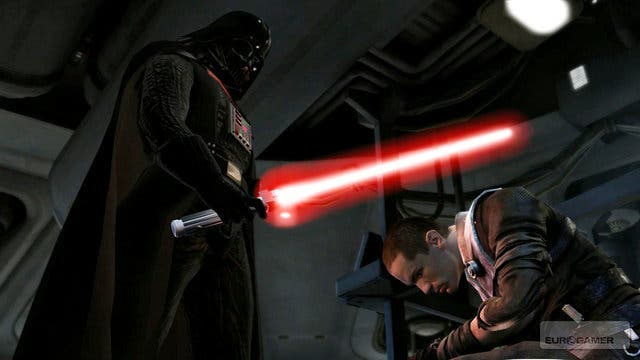
Technical prowess, however impressive, is not an adequate substitute for engaging game design. Playing through The Force Unleashed for a second time, I was reminded of Dan Whitehead's neat summary of Assassin's Creed on PC as "a 6/10 experience wrapped up in a 9/10 game engine". Ubisoft Montreal made the dangerous assumption that people would savour the game as the developer believed it ought to be experienced, and that's also true of LucasArts' effort.
But this is a Star Wars game and, in narrative terms, the most significant ever released. The stunning quality of the cinematics is everything you'd expect from a developer that shares office space with LucasFilm and Industrial Light & Magic, and the story is told with compelling vigour and convincing flair. The denouement is also fantastic, and it's worth noting that there is a second, non-canon ending on offer, depending on a decision you make in the final stage.
The introduction of memorable new characters like Proxy, the apprentice's beleaguered holodroid, and the smart and deliciously surprising deployment of familiar faces is expertly handled. And, for longtime fans of the fiction, the cathartic delight of slaughtering helpless Ugnaughts, Jawas and Wookiees cannot be overstated.
It gets an extra point, then, from this Star Wars obsessive for the story and the mostly magnificent recreation of the universe. As a fan you will want to experience what The Force Unleashed has to offer. It's just a shame that while there are occasional moments of brilliance when everything falls into place, they're not quite enough to back up the game's delusions of grandeur.

